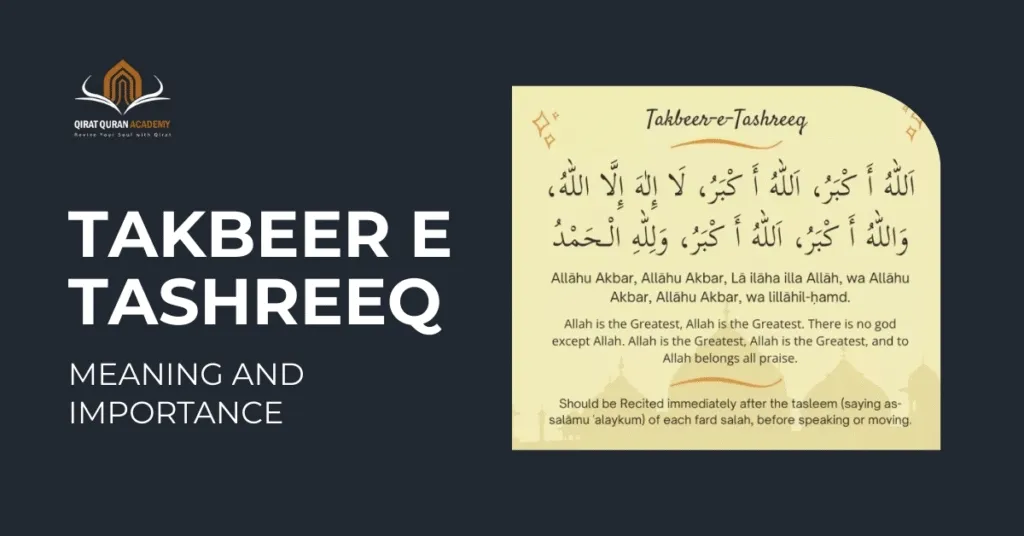Every year, during the blessed days of Dhul Hijah, Muslims from all over the world echoed a special remembrance that fills the air with devotion – Tacber e -Tashrik. For Allah, these powerful words of glory and praise are not just rituals; They have deep spiritual meaning and timeless importance. But what is really Takbeer e Tashreeq, and why is it considered so important in our belief?
In this article, we dive deep into its meaning, history, importance and every Muslim – youth or old – embrace this Sunnah honestly.
What is Takbeer e Tashreeq?
The Takbeer e TashreeQ phrases refer to a specific set of words that Muslims recite during Eid al-Dha and Haj pilgrimage days. This is the declaration of the greatness of Allah, the memory of his mercy and gratitude.
In simple words, Takbeer e Tashreeq is about stopping from worldly matters and raising a voice to glorify Allah, especially during some of the most sacred days of the Islamic calendar.
Historical Background of Takbeer e Tashreeq
The historical background of Takbeer E Tashreeq reveals its origin for the practices of his comrades during the Sunnah and Dhul Hijah of the Prophet (SAW).
Origin in Islamic Tradition
When Allah allowed Ibrahim (AS) to sacrifice his son, he wholeheartedly accepted and fulfilled Allah’s command. Muslims honor this act of devotion during Eid al-Aadha, and Takbir reminds us of his unwavering faith and sacrifice.
Evidence from Qur’an and Hadith
While the exact word is not found in the Quran, the command of the glorification of Allah is mentioned during the specific days. The scholars recited Takbir with authentic hadiths and practices of colleagues.
Narrations from the Companions
It has been reported that colleagues like Ibn Made (RA) and Ali (RA) will recite Takbir e -Tashrik after every compulsory prayer during the days of Tashcut, which will make it a firmly installed Sunnah.
Exact Wording of Takbeer e Tashreeq
The exact wording of Takbeer e Tashreeq is a powerful declaration of Allah’s greatness, recited in Arabic with deep spiritual meaning.
Arabic Text
The takbeer is recited as:
اللَّهُ أَكْبَرُ اللَّهُ أَكْبَرُ، لَا إِلَهَ إِلَّا اللَّهُ، وَاللَّهُ أَكْبَرُ اللَّهُ أَكْبَرُ وَلِلَّهِ الْحَمْدُ
English Translation
Allah is the Greatest, Allah is the Greatest. There is no god except Allah. Allah is the Greatest, Allah is the Greatest, and to Allah belongs all praise.
This simple yet profound statement is an affirmation of tawheed (Oneness of Allah) and gratitude.
When to Recite Takbeer e Tashreeq

Takbeer e Tashreeq is narrated after every compulsory prayer of 9th to 13th dusty hija.
Starting and Ending Days
Takbeer e Tashreeq starts with 9th dust Hijah (Arafah’s day) and continues till 13th of Dhul Hijah. It covers a total of five days.
Timing During the Day
It is narrated after every ferd (compulsory) prayer, whether you pray alone or in the congregation.
After Obligatory Prayers
According to scholars, both men and women should listen to it after five daily prayers, which started from the 9th Dhul Hijah from Fajr and ended with ASR on 13th.
The Importance of Takbeer e Tashreeq
The importance of Takbeer e Tashreeq lies in the glorification of Allah, strengthening faith and reminding believers.
Strengthening Connection with Allah
Reciting Takbeer e Tashreeq is more than a task of obedience; It nourishes with Allah in relation to the heart from the heart. Each phrase is reminiscent of its greatness and our dependence on it.
Spiritual and Psychological Benefits
The way confirmation shapes our mindset, repeating again makes our hearts filled with peace and gratitude. This is a way to demolish the soul with worldly concerns.
Reminder of Gratitude and Submission
To say that “Lillalah Il-Hamad” (is all praise for Allah) is a gentle elite to be grateful to his countless blessings, big and younger.
The Role of Takbeer e Tashreeq in Hajj and Eid
The role of Takbir E Tashrik in Haj and Eid is to unite Muslims in glorifying Allah and honoring the sacrifice of Prophet Ibrahim (AS).
Significance During Eid al-Adha
During Eid al-Aadha, Muslims are ordered to glorify Allah. Takbeer e Tashreeq acts as a collective voice of Ummah, which celebrates Allah’s greatness unilaterally.
Connection with Ibrahim’s Sacrifice
When we chant Takbir, we remember the story of the Prophet Ibrahim (as). This is not just history – it is a living lesson of belief, obedience and presenting.
Common Mistakes Muslims Make
With normal mistakes, Muslims involved Takbir e -Tashlis forgetting their time and misunderstand its words.
Forgetting to Recite at the Right Time
Many Muslims left Taki spontaneously after prayer due to lack of awareness. As a result, a Sunnah is remembered which gives immense prizes.
Mispronunciation of the Takbeer
Sometimes the takbeer is rushed or mispronounced, losing its essence. Learning the correct wording ensures we recite it as it was practiced by the companions.
How to Teach Children Takbeer e Tashreeq
Teaching children Takbeer e Tashreeq can be made easy through engaging methods, family practice, and building spiritual habits early.
Fun and Engaging Learning Methods
Teaching kids doesn’t have to be rigid. Parents can sing the takbeer together as a family, use visual aids, or even create fun charts to help them remember.
Building Spiritual Habits Early
Just like bedtime stories, reciting takbeer with children can become a family tradition — instilling love for dhikr from a young age.
Takbeer e Tashreeq in Daily Life
Takbeer e Tashreeq in daily life reminds Muslims to glorify Allah beyond Eid, nurturing gratitude and spiritual mindfulness every day.
Beyond Eid – Incorporating the Spirit Daily
Although specifically recited during Dhul Hijjah, the message of takbeer applies year-round. Praising Allah daily strengthens faith and helps us stay mindful of His presence.
Personal Reflection and Dhikr
By reflecting on the meaning of the takbeer, we bring its spirit into our daily dhikr, making every day a reminder of Allah’s greatness.
Frequently Asked Questions (FAQs)
The wording is: Allahu Akbar, Allahu Akbar, La ilaha illa Allah, Allahu Akbar, Allahu Akbar wa lillahil-hamd.
It is recited once after each of the five daily compulsory prayers from 9th to 13th dust Hijazah.
According to many scholars, reciting after prayer for men is wazeeb, while women also read it but in a low voice.
Yes, women should also recite it, although they read slowly without raising their voice.
If you forget, the person should not repeat it later, but try to pay attention to the next prayer.
Conclusion
Takbeer e Tashreeq is more than repeated words during special days. It is the greatness of Allah, the legacy of sacrifice by Prophet Ibrahim (AS), and a practice that unites Muslims around the world.
Understanding its meaning and importance, by listening to it with honesty and teaching future generations, we can ensure that this Sunnah continues to brighten our lives.




